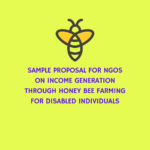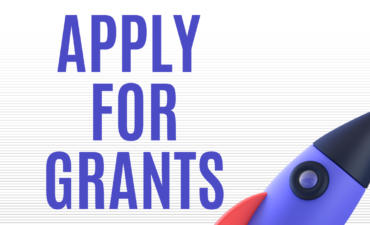Introduction: Sample Proposal for NGOs on Income Generation through Honey Bee farming for Disabled Individuals, in the pursuit of fostering inclusivity and empowerment, it is imperative to create opportunities that cater to the diverse needs of society. Among various marginalized groups, individuals with disabilities often face significant barriers in accessing economic opportunities, thereby hindering their financial independence and overall well-being. Recognizing the potential of agriculture as a means of sustainable livelihood, this proposal endeavors to introduce honey bee farming as a viable income-generating venture specifically tailored for disabled individuals.
Honey bee farming, also known as apiculture, presents a promising avenue for income generation due to its relatively low investment requirement, high market demand for honey and hive products, and the ability to operate on small scales with minimal physical labor. Moreover, beekeeping offers numerous ancillary benefits such as pollination support for agriculture, ecological conservation, and skill development.
This proposal aims to collaborate with Non-Governmental Organizations (NGOs) dedicated to the welfare of disabled individuals to implement comprehensive training programs, establish beekeeping infrastructure, and provide ongoing support to facilitate the successful adoption of honey bee farming as a sustainable livelihood option. By leveraging the inherent adaptability of beekeeping practices to accommodate diverse abilities and needs, we seek to empower disabled individuals to become self-reliant beekeepers and active contributors to their communities.
Background Information on the Significance of Honey Bee Farming: (Sample Proposal for NGOs on Income Generation through Honey Bee farming for Disabled Individuals)
Honey bee farming, or apiculture, holds multifaceted significance both economically and ecologically. As one of the oldest forms of agriculture, dating back thousands of years, beekeeping has evolved into a crucial industry worldwide. Here are key points highlighting its significance:
- Economic Importance: Honey bee farming serves as a vital source of income for millions of people globally. The production of honey, beeswax, royal jelly, pollen, and propolis offers diverse revenue streams. Moreover, honey bee pollination significantly contributes to agricultural productivity, enhancing yields of crops ranging from fruits and vegetables to nuts and oilseeds. The economic impact of pollination services provided by bees is estimated in billions of dollars annually.
- Sustainable Livelihoods: Beekeeping is accessible to individuals across various socio-economic backgrounds due to its relatively low capital requirement and flexibility in scale. It offers opportunities for smallholder farmers, rural communities, and marginalized groups to generate income sustainably. Additionally, beekeeping can complement existing agricultural practices, diversifying income sources and enhancing resilience to environmental and economic fluctuations.
- Environmental Stewardship: Honey bees play a critical role in maintaining ecosystem health and biodiversity through pollination. Approximately one-third of the world’s food supply depends on pollinators, with bees being the most efficient pollinators among them. By facilitating the reproduction of flowering plants, bees contribute to the stability of ecosystems and the conservation of wild plant species. Furthermore, beekeeping promotes sustainable land use practices, encourages habitat preservation, and fosters ecological awareness among communities.
- Cultural and Culinary Heritage: Honey has cultural and culinary significance in many societies, symbolizing sweetness, hospitality, and tradition. Beekeeping practices are deeply rooted in cultural rituals, folklore, and culinary traditions worldwide. The diversity of honey flavors and the artisanal production of hive products contribute to culinary richness and gastronomic appreciation.
In summary, honey bee farming transcends its role as a mere agricultural activity; it embodies a holistic approach to sustainable development, encompassing economic empowerment, environmental stewardship, and cultural preservation.
Introduction of the Target Group: Disabled Individuals: (Sample Proposal for NGOs on Income Generation through Honey Bee farming for Disabled Individuals)
Disabled individuals constitute a diverse and often marginalized segment of society, facing various socio-economic challenges and barriers to participation. This proposal specifically targets disabled individuals, including those with physical, sensory, intellectual, or developmental disabilities, recognizing their unique strengths, capabilities, and rights to equal opportunities. Despite their potential, disabled individuals frequently encounter limited access to education, employment, and social inclusion opportunities, exacerbating their vulnerability and dependency.
By engaging disabled individuals in honey bee farming, we aim to address these disparities and empower them to lead dignified, independent lives. Beekeeping offers a conducive environment for accommodating diverse abilities, as it can be adapted to suit individual needs and preferences. Whether through hive management, honey extraction, marketing, or value-added product development, disabled individuals can actively participate in various aspects of beekeeping, harnessing their skills, creativity, and autonomy.
Moreover, beekeeping fosters a sense of community and belonging, providing disabled individuals with opportunities for social interaction, skill development, and self-expression. By promoting inclusivity and diversity within the beekeeping sector, we envision creating a supportive ecosystem where disabled individuals are valued for their contributions and respected for their intrinsic worth.
Purpose and Objectives of the Proposal: (Sample Proposal for NGOs on Income Generation through Honey Bee farming for Disabled Individuals)
The purpose of this proposal is to establish income-generating opportunities through honey bee farming for disabled individuals, thereby enhancing their economic independence, social inclusion, and overall well-being. The objectives of the proposal include:
- Empowering Disabled Individuals: Provide training, resources, and support to enable disabled individuals to engage in beekeeping as a sustainable livelihood option.
- Economic Empowerment: Facilitate the establishment of beekeeping enterprises owned and operated by disabled individuals, thereby generating income and promoting financial independence.
- Capacity Building: Equip disabled individuals with the necessary skills, knowledge, and resources to effectively manage bee colonies, harvest hive products, and market honey and other bee-derived products.
- Social Inclusion: Foster a supportive and inclusive environment within the beekeeping community, where disabled individuals are valued, respected, and integrated into all aspects of the beekeeping value chain.
- Environmental Sustainability: Promote sustainable beekeeping practices that prioritize the health and welfare of honey bee colonies, conserve biodiversity, and mitigate environmental degradation.
By achieving these objectives, we aim to create a more inclusive and equitable society where disabled individuals are empowered to realize their full potential and contribute actively to their communities’ socio-economic development.
Project Description (Sample Proposal for NGOs on Income Generation through Honey Bee farming for Disabled Individuals)
Detailed Explanation of Honey Bee Farming:
Honey bee farming, also known as apiculture, involves the management of colonies of honey bees for the purpose of harvesting hive products such as honey, beeswax, royal jelly, pollen, and propolis. The process typically begins with the establishment of beehives, which serve as the primary habitat for honey bee colonies. Beekeepers employ various techniques to maintain the health and productivity of their colonies, including providing adequate nutrition, disease management, and hive maintenance.
The key components of honey bee farming include:
- Hive Management: Beekeepers monitor the condition of their hives regularly, inspecting for signs of disease, pest infestations, and overall colony health. They may perform interventions such as feeding bees during times of nectar scarcity or applying treatments to control parasites and pathogens.
- Honey Extraction: When honey production reaches its peak, beekeepers harvest honey from the hives using specialized equipment such as honey extractors and uncapping knives. The extracted honey is then filtered and stored for consumption or sale.
- Pollination Services: Honey bees play a crucial role in pollinating flowering plants, including many agricultural crops. Beekeepers may also offer pollination services to farmers, renting out their colonies to enhance crop yields.
- Value-Added Products: In addition to honey, beekeepers can utilize hive products such as beeswax, royal jelly, pollen, and propolis to create value-added products such as candles, cosmetics, dietary supplements, and medicinal remedies.
Benefits of Honey Bee Farming for Income Generation:
Honey bee farming offers numerous benefits for income generation, making it an attractive livelihood option for individuals and communities:
- High Market Demand: Honey and hive products have a consistently high demand in local, regional, and international markets. The versatility of honey as a natural sweetener and ingredient in various culinary and medicinal products ensures a steady demand throughout the year.
- Low Capital Investment: Compared to many other agricultural ventures, beekeeping requires relatively low startup costs and infrastructure. With minimal equipment and space requirements, beekeeping is accessible to individuals with limited financial resources.
- Scalability: Beekeeping operations can be scaled to suit the available resources and capacity of the beekeeper, ranging from small backyard apiaries to commercial operations with hundreds or thousands of hives. This scalability allows beekeepers to expand their operations gradually as their experience and resources grow.
- Sustainable Income: Honey bee farming offers a source of sustainable income, as honey production continues year-round in most regions. Additionally, beekeepers can diversify their income streams by offering pollination services, selling value-added products, or participating in agritourism activities such as honey tastings and farm tours.
- Environmental Benefits: Beekeeping promotes environmental sustainability by supporting pollinator populations, enhancing biodiversity, and contributing to ecosystem resilience. Through pollination services, honey bees play a vital role in ensuring the productivity of agricultural crops and maintaining ecosystem health.
Importance of Involving Disabled Individuals in Income-Generating Activities:
Involving disabled individuals in income-generating activities such as honey bee farming is essential for several reasons:
- Economic Empowerment: Participation in income-generating activities empowers disabled individuals to achieve financial independence, reducing their dependence on social welfare programs and enhancing their economic self-sufficiency.
- Social Inclusion: Engaging disabled individuals in productive activities fosters a sense of belonging and social inclusion within their communities. By contributing to the local economy and participating in meaningful work, disabled individuals gain recognition and respect from their peers.
- Skill Development: Income-generating activities provide opportunities for disabled individuals to develop new skills, enhance their existing abilities, and gain valuable work experience. Through training and hands-on experience in beekeeping, disabled individuals can acquire marketable skills that increase their employability and self-confidence.
- Psychological Well-being: Meaningful employment and productive activities have positive effects on mental health and psychological well-being. By engaging in purposeful work such as beekeeping, disabled individuals experience a sense of accomplishment, purpose, and fulfillment, leading to improved self-esteem and quality of life.
- Advocacy and Awareness: Involving disabled individuals in income-generating activities helps raise awareness about disability rights, challenges, and capabilities within society. By showcasing the abilities and contributions of disabled individuals, we challenge stereotypes and promote a more inclusive and equitable society for all.
Needs Assessment (Sample Proposal for NGOs on Income Generation through Honey Bee farming for Disabled Individuals)
Statistics and Data on the Unemployment Rate among Disabled Individuals:
- Globally, disabled individuals face disproportionately high rates of unemployment compared to the general population. According to the International Labour Organization (ILO), the unemployment rate among disabled individuals is estimated to be as much as two to three times higher than the global average.
- In many countries, disabled individuals often encounter significant barriers to employment, including discrimination, lack of accessibility, inadequate training and education opportunities, and negative perceptions about their capabilities.
- According to data from the U.S. Bureau of Labor Statistics, the unemployment rate among people with disabilities in the United States was around twice as high as that of people without disabilities, with variations among different disability types and demographic groups.
- Similarly, studies from the European Union have shown that disabled individuals are consistently more likely to be unemployed or economically inactive compared to their non-disabled counterparts, highlighting the persistent disparities in labor market participation.
Challenges Faced by Disabled Individuals in Accessing Income-Generating Opportunities:
- Discrimination and Stigma: Disabled individuals often face discrimination and stigma in the workplace, leading to limited job opportunities and lower wages. Employers may hold misconceptions about the abilities of disabled individuals, resulting in reluctance to hire or accommodate them.
- Lack of Accessibility: Physical, sensory, and attitudinal barriers in the workplace can make it difficult for disabled individuals to access employment opportunities. Inadequate infrastructure, inaccessible transportation, and a lack of assistive technologies further exacerbate these challenges.
- Limited Training and Education: Many disabled individuals experience barriers to accessing quality education and vocational training, limiting their skill development and career advancement opportunities. Without relevant qualifications or training, disabled individuals may struggle to compete in the job market.
- Financial Insecurity: Unemployment and underemployment among disabled individuals contribute to financial insecurity, poverty, and reliance on social welfare programs. Limited access to income-generating opportunities perpetuates cycles of economic vulnerability and dependency.
Potential Benefits of Honey Bee Farming Specifically for Disabled Individuals:
- Adaptability: Honey bee farming can be adapted to accommodate a wide range of abilities and disabilities, making it an inclusive and accessible livelihood option for disabled individuals. Tasks such as hive management, honey extraction, and product packaging can be modified to suit individual needs and preferences.
- Low Physical Demands: Compared to many other agricultural activities, beekeeping requires relatively low physical exertion, making it suitable for individuals with mobility impairments or chronic health conditions. Beekeeping tasks can be performed while seated or with the assistance of adaptive equipment.
- Flexibility: Beekeeping offers flexibility in terms of work hours and schedules, allowing disabled individuals to work at their own pace and manage their energy levels effectively. Beekeeping can be pursued on a part-time or seasonal basis, accommodating the varying abilities and preferences of disabled individuals.
- Social Interaction: Beekeeping provides opportunities for social interaction and community engagement, which can combat feelings of isolation and loneliness often experienced by disabled individuals. Participation in beekeeping associations, workshops, and markets fosters a sense of belonging and camaraderie among beekeepers.
- Empowerment and Independence: Engaging in honey bee farming empowers disabled individuals to take control of their livelihoods, build self-confidence, and demonstrate their capabilities to themselves and others. By earning a sustainable income through beekeeping, disabled individuals can achieve greater financial independence and autonomy.
Project Goals and Objectives (Sample Proposal for NGOs on Income Generation through Honey Bee farming for Disabled Individuals)
Long-term Goal: Empower Disabled Individuals Through Sustainable Income Generation:
The overarching goal of the project is to empower disabled individuals by creating sustainable income-generating opportunities through honey bee farming. By engaging disabled individuals in beekeeping, the project aims to enhance their economic independence, social inclusion, and overall well-being, ultimately leading to long-term empowerment and self-sufficiency.
Short-term Objectives:
- Train Disabled Individuals in Beekeeping Techniques:
- Develop and implement comprehensive training programs tailored to the needs and abilities of disabled individuals.
- Provide hands-on training in beekeeping techniques, hive management, honey extraction, and product processing.
- Offer training in safety protocols, disease management, and environmental conservation practices.
- Provide Necessary Resources and Support for Establishing Bee Farms:
- Supply disabled individuals with essential beekeeping equipment, including beehives, protective gear, and harvesting tools.
- Assist participants in securing suitable locations for establishing bee farms, considering accessibility and environmental factors.
- Offer technical assistance and guidance in hive setup, colony management, and site maintenance.
- Facilitate Market Access for Honey and Related Products:
- Identify and establish market linkages with local buyers, retailers, wholesalers, and honey cooperatives.
- Assist participants in branding, packaging, and labeling their honey and hive products to meet market standards and regulations.
- Provide marketing support through promotional activities, including participation in farmers’ markets, trade fairs, and online platforms.
- Monitor and Evaluate the Progress of Participants:
- Develop monitoring and evaluation frameworks to track the progress and impact of the project on disabled individuals.
- Conduct regular assessments to measure participants’ knowledge acquisition, skill development, and income generation.
- Collect feedback from participants, stakeholders, and community members to identify challenges, successes, and areas for improvement.
- Use monitoring and evaluation findings to adapt and refine project strategies, ensuring the effectiveness and sustainability of interventions.
By achieving these short-term objectives, the project aims to lay the foundation for long-term success and empowerment among disabled individuals engaged in honey bee farming. Through targeted training, resource provision, market facilitation, and monitoring efforts, the project seeks to create a supportive environment where disabled individuals can thrive as beekeepers, entrepreneurs, and active members of their communities.
Project Implementation Plan (Sample Proposal for NGOs on Income Generation through Honey Bee farming for Disabled Individuals)
Training Program for Disabled Individuals:
- Needs Assessment: Conduct an initial assessment to identify the specific training needs and preferences of disabled individuals interested in beekeeping.
- Curriculum Development: Design a comprehensive training curriculum covering beekeeping techniques, hive management, safety protocols, and business skills tailored to the abilities and learning styles of participants.
- Delivery Methods: Implement a combination of classroom sessions, practical demonstrations, hands-on activities, and interactive workshops to accommodate diverse learning needs.
- Accessibility Measures: Ensure that training venues are wheelchair accessible, provide assistive technologies and materials for participants with sensory impairments, and offer support services such as sign language interpreters or personal assistants as needed.
- Training Evaluation: Regularly assess participants’ progress and comprehension through quizzes, practical assessments, and feedback sessions to tailor the training program to their evolving needs.
Procurement and Setup of Beekeeping Equipment:
- Equipment Assessment: Determine the specific beekeeping equipment required based on the size and scale of participants’ bee farms, including beehives, protective gear, harvesting tools, and processing equipment.
- Vendor Selection: Identify reliable suppliers or manufacturers of beekeeping equipment and negotiate competitive pricing and favorable terms for bulk purchases.
- Procurement Process: Procure the necessary equipment according to participants’ specifications and budget constraints, ensuring timely delivery and quality assurance.
- Setup and Installation: Provide assistance in assembling and installing beekeeping equipment at participants’ bee farms, offering guidance on optimal placement, spacing, and maintenance practices.
Assistance in Establishing Bee Farms:
- Site Selection: Assist participants in identifying suitable locations for establishing bee farms, considering factors such as proximity to forage sources, access to water, and environmental suitability.
- Hive Placement: Provide guidance on the layout and arrangement of beehives within the apiary, optimizing hive density, orientation, and spacing to maximize productivity and ease of management.
- Colony Acquisition: Facilitate the acquisition of honey bee colonies or nucleus colonies from reputable sources, ensuring the procurement of healthy, disease-free bees adapted to local conditions.
- Hive Management Training: Offer ongoing training and support in hive management practices, including regular inspections, pest and disease monitoring, swarm prevention, and seasonal maintenance tasks.
Marketing and Sales Strategy for Honey and Bee-Related Products:
- Product Development: Collaborate with participants to develop high-quality honey and value-added bee products such as beeswax candles, propolis tinctures, and pollen supplements.
- Branding and Packaging: Assist participants in branding their products and designing attractive packaging labels and materials that reflect their unique identity and value proposition.
- Market Research: Conduct market research to identify target customer segments, demand trends, pricing strategies, and distribution channels for honey and bee-related products in local and regional markets.
- Sales Channels: Explore various sales channels, including farmers’ markets, specialty stores, online platforms, and community events, to promote and sell participants’ products directly to consumers.
- Promotional Activities: Organize promotional events, tastings, demonstrations, and educational workshops to raise awareness about participants’ products, build customer loyalty, and generate sales leads.
Continuous Support and Mentorship for Participants:
- Ongoing Guidance: Provide continuous support, mentorship, and technical assistance to participants throughout the duration of the project, addressing any challenges or concerns they may encounter.
- Peer Learning: Facilitate peer learning and networking opportunities among participants, encouraging knowledge sharing, collaboration, and mutual support within the beekeeping community.
- Access to Resources: Connect participants with relevant resources, information, and funding opportunities to further develop their beekeeping skills, expand their businesses, and pursue new market opportunities.
- Monitoring and Evaluation: Monitor participants’ progress, performance, and satisfaction with the project interventions through regular check-ins, surveys, and feedback mechanisms, adjusting support services as needed to ensure their success.
- Long-Term Sustainability: Foster a culture of self-reliance and resilience among participants by equipping them with the knowledge, skills, and resources needed to independently manage and grow their beekeeping enterprises beyond the project’s duration.
Budget (Sample Proposal for NGOs on Income Generation through Honey Bee farming for Disabled Individuals)
| Expense Category | Amount (USD) |
| Training Materials/Resources | $10,000 |
| Equipment Procurement | $20,000 |
| Farm Setup and Maintenance | $15,000 |
| Marketing and Sales Expenses | $8,000 |
| Staff Salaries (if applicable) | $12,000 |
| Total | $65,000 |
Note: The budget provided above is for illustrative purposes only, and the amounts listed are placeholders. Actual budget allocations may vary depending on the specific context, project scope, and available resources. It is essential to conduct a thorough assessment of project needs and financial considerations to develop a realistic and tailored budget. Adjustments to the budget may be necessary throughout the project lifecycle to accommodate changes in priorities, unforeseen expenses, or new opportunities.
Monitoring and Evaluation (Sample Proposal for NGOs on Income Generation through Honey Bee farming for Disabled Individuals)
Methods for Tracking Progress and Impact:
- Quantitative Data Collection: Implement quantitative methods such as surveys, questionnaires, and structured interviews to collect data on key indicators related to project outcomes. These may include the number of disabled individuals trained, the quantity of honey produced and sold, and changes in participants’ income levels.
- Qualitative Assessments: Conduct qualitative assessments through focus group discussions, participant observations, and case studies to gather in-depth insights into participants’ experiences, challenges, and successes. Qualitative data can provide valuable context and understanding of the impact of the project on participants’ lives.
- Recordkeeping and Documentation: Maintain detailed records of project activities, expenditures, and achievements to track progress over time. Keep comprehensive documentation of training sessions, equipment procurement, farm setup, marketing efforts, and sales transactions for evaluation purposes.
- Stakeholder Feedback: Solicit feedback from project stakeholders, including participants, project staff, partner organizations, and community members, to assess the relevance, effectiveness, and sustainability of project interventions. Regular communication and engagement with stakeholders can help identify areas for improvement and ensure accountability.
Evaluation Criteria: (Sample Proposal for NGOs on Income Generation through Honey Bee farming for Disabled Individuals)
- Economic Empowerment of Participants:
- Measure changes in participants’ income levels, employment status, and economic self-sufficiency before and after participating in the project.
- Assess the extent to which disabled individuals have achieved financial independence, diversified their income sources, and improved their livelihoods through beekeeping activities.
- Increase in Honey Production and Sales:
- Quantify the volume of honey produced and sold by participants over time, comparing pre-project and post-project production levels.
- Track sales revenues, market penetration, and customer feedback to evaluate the commercial viability and competitiveness of participants’ honey and bee-related products.
- Improvement in the Quality of Life for Disabled Individuals:
- Use indicators such as self-reported quality of life, social inclusion, and psychological well-being to assess the impact of beekeeping on participants’ overall quality of life.
- Monitor changes in participants’ levels of confidence, independence, and social connections as a result of their involvement in beekeeping activities.
- Gather testimonials, success stories, and anecdotal evidence to illustrate the positive outcomes and transformative effects of the project on disabled individuals and their families.
By employing a combination of quantitative and qualitative methods and focusing on key evaluation criteria, the monitoring and evaluation process will provide valuable insights into the effectiveness, efficiency, and sustainability of the project in achieving its intended outcomes and impacts.
Sustainability Plan of the Project (Sample Proposal for NGOs on Income Generation through Honey Bee farming for Disabled Individuals)
Ensuring the sustainability of the project is paramount to its long-term success and impact. Sustainability encompasses environmental, social, and economic dimensions, and it requires careful planning, resource management, and community engagement.
Key considerations for promoting sustainability include:
- Environmental Stewardship: Implementing beekeeping practices that prioritize the health and well-being of honey bee colonies and their surrounding ecosystems. This includes promoting organic and sustainable farming practices, protecting natural habitats, and minimizing the use of pesticides and agrochemicals.
- Economic Viability: Developing beekeeping enterprises that are economically viable and self-sustaining in the long run. This involves investing in market research, value-added product development, and business management skills to enhance participants’ income-generating potential and market competitiveness.
- Social Inclusion: Fostering a supportive and inclusive environment where disabled individuals can actively participate in beekeeping activities and contribute to their communities’ socio-economic development. This includes providing ongoing training, mentorship, and support services to empower participants and promote social cohesion.
- Capacity Building: Building the capacity of participants, project staff, and local stakeholders to independently manage and sustain beekeeping initiatives beyond the project’s duration. This may involve providing technical assistance, promoting knowledge sharing, and strengthening institutional partnerships.
- Community Engagement: Engaging with local communities, government agencies, and other relevant stakeholders to garner support, raise awareness, and mobilize resources for beekeeping initiatives. Building strong community networks and partnerships fosters collective ownership and commitment to the project’s goals and objectives.
By addressing these sustainability considerations and fostering a holistic approach to beekeeping development, the project aims to create lasting positive impacts for disabled individuals, their communities, and the environment. Through continuous monitoring, evaluation, and adaptation, the project seeks to build resilience, promote self-reliance, and contribute to the sustainable development of beekeeping enterprises and livelihoods.
Conclusion
In conclusion, the proposal to empower disabled individuals through income generation via honey bee farming represents a significant opportunity to promote inclusivity, economic independence, and environmental stewardship. By harnessing the potential of beekeeping as a sustainable livelihood option, the project aims to address the unique challenges faced by disabled individuals in accessing meaningful employment and achieving financial self-sufficiency.
Through comprehensive training, provision of resources, and ongoing support, disabled individuals will be equipped with the skills, knowledge, and resources needed to succeed as beekeepers and entrepreneurs. The project’s emphasis on social inclusion, capacity building, and community engagement seeks to create a supportive ecosystem where disabled individuals are valued for their contributions and empowered to realize their full potential.
Moreover, by promoting sustainable beekeeping practices and fostering environmental awareness, the project contributes to the conservation of biodiversity and the protection of pollinator populations. The economic, social, and environmental benefits of beekeeping extend beyond individual participants to encompass entire communities, creating ripple effects of positive change and resilience.
In essence, the proposal encapsulates a vision of empowerment, dignity, and sustainability, where disabled individuals are not only beneficiaries but active agents of change in shaping their own destinies and contributing to a more inclusive and equitable society. Through collaborative efforts and a commitment to shared values, the project seeks to build a brighter, more inclusive future for all.
Related Good Reads, Link
Hey, STEAL our Best Premium Content For Absolutely Free, Check Out the Links below
HOPE these will add value to your existing skills and knowledge
Our information bears no cost (it’s absolutely FREE), don’t let valuable information slip away.
Join our community of avid readers who are always in the know. Subscribe to our website; stay connected and engaged with the latest news, trends, and developments by subscribing today.
(PUSH the bell ICON)
Leverage the power of knowledge to propel your organization to new heights. Don’t miss out to explore our content
- Latest Funds for NGOs,
- NGO Jobs
- Resources (Helpful Guides and Courses)
- Premium Resources
- NGO related articles
Empowering Humanity through Funds, Resources and Collective Action
Sharing is Appreciated









